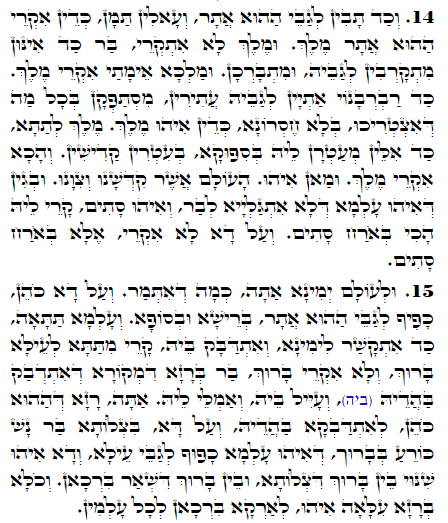Daily Zohar # 1889 – Ekev – Blessed from above and below

.
Hebrew translation:
15. וּלְעוֹלָם אַתָּה זֶה יָמִין, כְּמוֹ שֶׁנִּתְבָּאֵר. וְעַל זֶה כֹּהֵן כָּפוּף לְאוֹתוֹ מָקוֹם בָּרֹאשׁ וּבַסּוֹף. וְהָעוֹלָם הַתַּחְתּוֹן, כְּשֶׁנִּקְשָׁר לְיָמִין וְנִדְבָּק בּוֹ, קוֹרֵא מִלְּמַטָּה לְמַעְלָה בָּרוּךְ, וְלֹא נִקְרָא בָּרוּךְ, רַק בְּסוֹד הַמָּקוֹר שֶׁדָּבֵק בּוֹ וְנִכְנָס בּוֹ וּמְמַלֵּא אוֹתוֹ. אַתָּה, הַסּוֹד שֶׁל אוֹתוֹ הַכֹּהֵן לְהִדָּבֵק אִתּוֹ, וְעַל זֶה בַּתְּפִלָּה הָאָדָם כּוֹרֵעַ בְּבָרוּךְ, שֶׁהוּא הָעוֹלָם שֶׁכָּפוּף אֶל מַעְלָה, וְזֶהוּ הַשִּׁנּוּי בֵּין בָּרוּךְ שֶׁל הַתְּפִלָּה וּבֵין בָּרוּךְ שֶׁל שְׁאָר בְּרָכוֹת. וְהַכֹּל הוּא בְּסוֹד עֶלְיוֹן, לְהָרִיק בְּרָכוֹת לְכָל הָעוֹלָמוֹת.
.
Zohar Ekev
The commentary of Ekev this week will focus on the spiritual significance of blessings and the blessing of the food (Birkat Hamazon). I recommend the important study of previous commentaries on Ekev paragraphs 1 through 13. DZ 1587 (https://dailyzohar.com/daily-zohar-1587-2/) through DZ 1592.
Please read DZ 1591, 1592 to understand the following study.
When the words of the blessings from below ascend, they return to Binah. The six Sefirot of Zeir Anpin below use the words of the blessings to come close to Binah, that is then called ‘King’.
Because the ‘king’ is concealed (upper three sefirot), the words of the blessings that follow are in ‘third person’ form and not in the ‘second person’ form as in the first words of “Baruch Atah”, “Blessed you…”.
ex: Baruch atah, Adonai Eloheinu, Melech haolam, asher kidshanu b’mitzvotav, v’tzivanu …
“Blessed are You, Adonai our God, King of the world, who hallows us with mitzvot, commanding us to…”
The word of the blessing אתה ‘Atah’ is the aspect of the Right and Chessed. The word Adonai יהוה is the Center and the word Eloheinu אלהינו is to the Left.
When Malchut connects to the Right , which is Chessed then the blessing, ‘ברכה’ comes and Malchut is called ‘ברוך’ (Baruch) ‘Blessed’.
‘Baruch’ that is part of the prayers is in Malchut and in other blessings it’s in Chokmah and Binah.
{||}

 Previous: Ekev
Previous: Ekev

